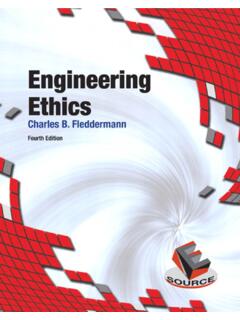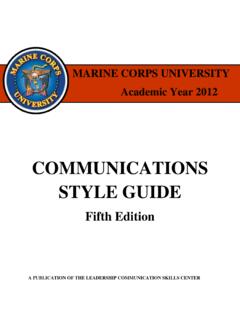Transcription of The Craft of Research - Shandong University
1 The Craft of ResearchOn Writing, Editing, and Publishingjacques barzunTelling About Societyhoward s. beckerTricks of the Tradehoward s. beckerWriting for Social Scientistshoward s. beckerPermissions, A Survival Guide: Blunt Talk about Art as Intellectual Propertysusan m. bielsteinThe Craft of Translationjohn biguenet and rainer schulte, editorsThe Craft of Researchwayne c. booth, gregory g. colomb, and joseph m. williamsGlossary of Typesetting Termsrichard eckersley, richard angstadt, charles m. ellerston, richard hendel, naomi b.
2 Pascal, and anita walker scottWriting Ethnographic Fieldnotesrobert m. emerson, rachel i. fretz, and linda l. shawLegal Writing in Plain Englishbryan a. garnerFrom Dissertation to Bookwilliam germanoGetting It Publishedwilliam germanoA Poet s Guide to Poetrymary kinzieThe chicago Guide to Collaborative Ethnographyluke eric lassiterHow to Write a BA Thesischarles lipsonCite Rightcharles lipsonThe chicago Guide to Writing about Multivariate Analysisjane e. millerThe chicago Guide to Writing about Numbersjane e. millerMapping It Outmark monmonierThe chicago Guide to Communicating Sciencescott l.
3 MontgomeryIndexing Booksnancy c. mulvanyGetting into Printwalter w. powellA Manual for Writers of Research Papers, Theses, and Dissertationskate l. turabianTales of the Fieldjohn van maanenStylejoseph m. williamsA Handbook of Biological Illustrationfrances w. zweifelThe Craft of Researchthird editionWAYNE C. BOOTHGREGORY G. COLOMBJOSEPH M. WILLIAMSTHE University OF chicago PRESSC hicago & Londonwayne c. booth was the George M. Pullman Distinguished Service Professor Emeritus at the University of chicago . His many books include The Rhetoric of Fiction, For the Love of It: Amateuring and Its Rivals, and The Essential Wayne Booth, each published by the University of chicago Press.
4 Professor Booth died in g. colomb is professor of English at the University of Virginia. He is the author of Designs on Truth: The Poetics of the Augustan Mock- m. williams was professor emeritus in the Department of English Language and Literature at the University of chicago . His books include Style: Toward Clarity and Grace, currently in its ninth edition. Professor Williams died in University of chicago Press, chicago 60637 The University of chicago Press, Ltd., London 1995, 2003, 2008 by The University of ChicagoAll rights reserved.
5 Published 2008 Printed in the United States of America17 16 15 14 13 12 11 10 09 08 1 2 3 4 5 ISBN- 13: 978- 0- 226- 06565- 6 (cloth)ISBN- 10: 0- 226- 06565- 0 (cloth)ISBN- 13: 978- 0- 226- 06566- 3 (paper)ISBN- 10: 0- 226- 06566- 9 (paper)Library of Congress Cataloging-in-Publication DataBooth, Wayne Craft of Research / Wayne C. Booth, Gregory G. Colomb, Joseph M. Williams. 3rd ed. p. cm. ( chicago guides to writing, editing, and publishing)Includes bibliographical references and : 978-0-226-06565-6 (cloth: alk.)
6 Paper)ISBN-10: 0-226-06565-0 (cloth: alk. paper)ISBN-13: 978-0-226-06566-3 (pbk.: alk. paper)ISBN-10: 0-226-06566-9 (pbk.: alk. paper) 1. Research Methodology. 2. Technical writing. I. Colomb, Gregory G. II. Williams, Joseph M. III. '2 dc222007042761o The paper used in this publication meets the minimum requirements of the American National Standard for Information Sciences Permanence of Paper for Printed Library Materials, ANSI : The Aims of This Edition xiOur Debts xvI Research , RESEARCHERS, AND READERS 1 PROLOGUE: BECOMING A RESEARCHER 31 Thinking in Print: The Uses of Research , Public and Private What Is Research ?
7 Why Write It Up? Why a Formal Report? Writing Is Thinking 142 Connecting with Your Reader: (Re- )Creating Yourself and Your Readers Creating Roles for Yourself and Your Readers Understanding Your Role Imagining Your Reader s Role 20 Quick Tip: A Checklist for Understanding Your Readers 26II ASKING QUESTIONS, FINDING ANSWERS 29 PROLOGUE: PLANNING YOUR PROJECT AN OVERVIEW 31 Quick Tip: Creating a Writing Group 343 From Topics to Questions From an Interest to a Topic 36 Contentsvi From a Broad Topic to a Focused One From a Focused Topic to Questions From a Question to Its Signifi cance 45 Quick Tip: Finding Topics 494 From Questions to a Problem Distinguishing Practical and Research Problems Understanding the Common Structure of Problems Finding a Good Research Problem Learning to Work with Problems 64 Quick Tip.
8 Manage the Unavoidable Problem of Inexperience 665 From Problems to Sources Knowing How to Use Three Kinds of Sources Locating Sources through a Library Locating Sources on the Internet Evaluating Sources for Relevance and Reliability Following Bibliographical Trails Looking beyond Predictable Sources Using People as Primary Sources 81 Quick Tip: The Ethics of Using People as Sources of Data 836 Engaging Sources Knowing What Kind of Evidence to Look For Record Complete Bibliographical Data Engaging Sources Actively Using Secondary Sources to Find a Problem Using Secondary Sources to Plan Your Argument Recording What You Find 95 Quick Tip: Manage Moments of Normal Anxiety 101 III MAKING A CLAIM AND SUPPORTING IT 103 PROLOGUE: ASSEMBLING A Research ARGUMENT 1057 Making Good Arguments.
9 An Overview Argument as a Conversation with Readers Supporting Your Claim 110 Contents Acknowledging and Responding to Anticipated Questions and Objections Warranting the Relevance of Your Reasons Building a Complex Argument Out of Simple Ones Creating an Ethos by Thickening Your Argument 117 Quick Tip: A Common Mistake Falling Back on What You Know 1198 Making Claims Determining the Kind of Claim You Should Make Evaluating Your Claim 122 Quick Tip: Qualifying Claims to Enhance Your Credibility 1279 Assembling Reasons and Evidence Using Reasons to Plan Your Argument Distinguishing Evidence from Reasons Distinguishing Evidence from Reports of It Evaluating Your Evidence 13510 Acknowledgments and Responses Questioning Your Argument as Your Readers Will Imagining Alternatives to Your Argument Deciding What to Acknowledge Framing Your Responses as Subordinate Arguments The Vocabulary of Acknowledgment and Response 146 Quick Tip.
10 Three Predictable Disagreements 15011 Warrants Warrants in Everyday Reasoning Warrants in Academic Arguments Understanding the Logic of Warrants Testing Whether a Warrant Is Reliable Knowing When to State a Warrant Challenging Others Warrants 164 Quick Tip: Two Kinds of Arguments 169viii contentsIV PLANNING, DRAFTING, AND REVISING 171 PROLOGUE: PLANNING AGAIN 173 Quick Tip: Outlining and Storyboarding 17512 Planning Avoid Three Common but Flawed Plans Planning Your Report 17913 Drafting Your Report Draft in a Way That Feels Comfortable Use Key Words to Keep Yourself on Track Quote, Paraphrase.

